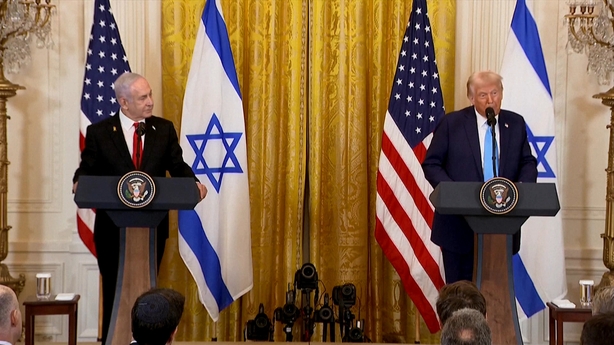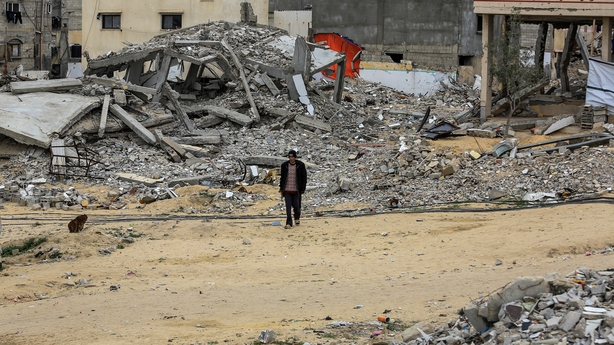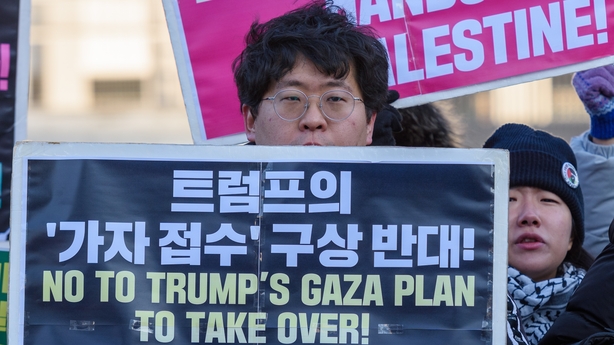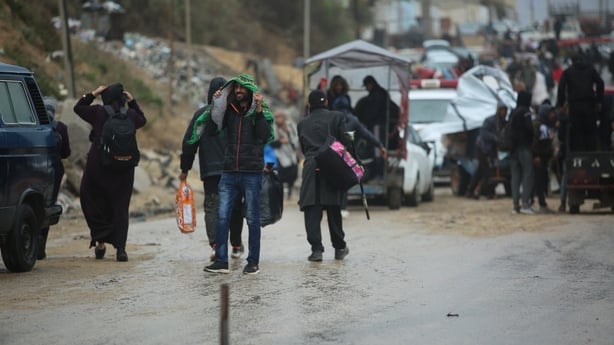On Tuesday evening at the White House, President Donald Trump shocked the world with a suggestion that would amount to the most dramatic change in US policy on the Middle East in decades.
He announced that the US would take control of Gaza for the "long term" and that Palestinians would be moved out while Gaza is redeveloped into the "Riviera of the Middle East".
Mr Trump had suggested that Palestinians be relocated to neighbouring countries Egypt and Jordan last week - but the move towards US ownership of the Palestinian territory took everyone by surprise.
What exactly did Trump propose?
Flanked by Israeli Prime Minister Benjamin Netanyahu at a White House press conference, Donald Trump said: "The US will take over the Gaza Strip, and we will do a job with it too."
He added that the US will own Gaza and be responsible for disposing of unexploded munitions and rebuilding Gaza into a hub for jobs and tourism.

He said he didn't want to sound like a wise guy, but appeared to approach the project like one of his real estate deals, saying he would turn Gaza into "the Riviera of the Middle East", using a term often used to describe the coastal regions of southern France and northern Italy.
There was little detail provided as to how the plan would be carried out, but he did say that it would be "a long-term ownership position" and that it would not be handed back to the Palestinian people.
Gaza, he said, would be "not for a specific group of people but for everybody".
Does Donald Trump's plan constitute ethnic cleansing?
The announcement was immediately met with outrage.
Congresswoman Rashida Tlaib on X: "This president is openly calling for ethnic cleansing while sitting next to a genocidal war criminal. He's perfectly fine cutting off working Americans from federal funds while the funding to the Israeli government continues flowing."
This president is openly calling for ethnic cleansing while sitting next to a genocidal war criminal. He's perfectly fine cutting off working Americans from federal funds while the funding to the Israeli government continues flowing. https://t.co/Pw86wA8kOF
— Congresswoman Rashida Tlaib (@RepRashida) February 4, 2025
US Senator Chris Van Hollen called the plan "ethnic cleansing by another name".
The phrase "ethnic cleansing" was first used widely in the 1990s to describe the violence towards ethnic groups in the Balkan war that broke out after the collapse of the former Yugoslavia.
In particular, the term was used to describe the massacre of Muslim Bosnians in Srebrenica in July 1995.
In his 1993 article 'A Brief History of Ethnic Cleansing', published in the magazine Foreign Affairs, Andrew Bell-Fialkoff wrote that the aim of the Serbian campaign was "the expulsion of an 'undesirable' population from a given territory due to religious or ethnic discrimination, political, strategic or ideological considerations, or a combination of those".
Ethnic cleansing has been defined as the attempt to get rid of, through forced displacement or even mass killing, members of an unwanted ethnic group in order to establish an ethnically homogenous geographic area.

If it was done forcibly, the relocation of the entire Palestinian population of Gaza would appear to meet this definition.
However, Mr Trump stated that the people of Gaza would be delighted with his plan - that they would willingly relocate.
"I heard that Gaza has been very unlucky for them. They live like hell. They live like they're living in hell. Gaza is not a place for people to be living, and the only reason they want to go back - and I believe this strongly - is because they have no alternative," he said.
Later, he said that wealthy nations in the region could finance the resettlement and find Gazans "a good, fresh, beautiful piece of land".
"I would think that they would be thrilled," he said.
He was repeatedly asked if he would force Palestinians to relocate even if they did not want to.
"I don’t think they’re going to tell me no," he said.
A voluntary movement of Gazans would not constitute ethnic cleansing, but the US President's statement seems like wishful thinking.
So far, Palestinians have roundly rejected the relocation plan. And, during the Bosnian war, perpetrators of ethnic cleansing often portrayed their actions as voluntary relocations by the victims.
As such, Mr Trump's voluntary defence wouldn't necessarily rule out ethnic cleansing.
Rana Tomaira, Senior Lecturer of Social Research and Public Policy at NYU in Abu Dhabi, is not in any doubt. "It's a clear plan and statement intent and also a call to action for ethnic cleansing," she told RTÉ News.
"It happened in '48. It happened in ‘67 and it was happening all along except low grade ethnic cleansing. And then comes Trump and it's out in the open. So it's basically the true face of the colonial endeavour, but also the true the true face of US politics towards the Palestinians," she added.
She said it was immaterial whether people would be forcibly moved from their land, because by making Gaza uninhabitable the people were already being forced out.
How would the plan be carried out?
Of course, Hamas has already objected to the proposal. Senior Hamas official Sami Abu Zuhri said that Mr Trump's proposed relocation was "a recipe for creating chaos and tension in the region".
The Palestinian ambassador to Ireland, Jilan Wahba Abdalmajid, told RTÉ’s Morning Ireland that no one on earth could uproot the Palestinian people from their land.
"We belong there, and we will remain there", she said. "This is our land, and we will defend it and defend our legitimate right to be there," she added.
In other words, it is very unlikely that Palestinians will leave Gaza voluntarily. If the US is going to "take over" the territory as President Trump said, it would almost certainly require a huge military deployment.

That would constitute the most expansive commitment of US forces in the Middle East since the invasion and reconstruction of Iraq two decades ago.
And it would be an incredible about-turn for a president who famously opposed the invasion of Iraq and vowed that the US would become less involved in global conflicts under his watch.
Egypt, Jordan and Saudi Arabia already rejected the notion of relocating Palestinians to their countries. In a joint statement, they said the transfer of Palestinians from their land would threaten stability in the region and undermine peace.
Mr Trump addressed this in his press conference. "They say they’re not going to accept," he announced. "I say they will."
How exactly he imposes his will on the region remains to be seen.
Rana Tomaira said the idea of US troops in Gaza was not far-fetched at all. She said the 15-month war was already orchestrated by the United States, and she says the fact that it stopped immediately when the US President demanded it, was proof of that.
"Throwing this idea out, lets people think, of its plausibility and debate it," she said. "So, it kind of normalises ethnic cleansing."
What does this mean for the ceasefire?
One of the premises of Benjamin Netanyahu's trip to Washington was to discuss the second phase of the ceasefire deal for Gaza.
The agreement outlined that negotiations for the second phase of the deal would begin on the 16th day.
Today is day 18 of the ceasefire.
The second phase is due to see the remainder of the Israeli hostages held by Hamas released and oversee a full Israeli troop withdrawal from Gaza.

If the US plans to occupy Gaza, surely US troops would need to be on the ground before any full withdrawal by the Israelis. Given the complexity of such an operation, this could potentially delay any Israeli troop withdrawal from the enclave.
In President Joe Biden's final address, he said the ceasefire would remain in place until the details of the second phase are finalised, even if that takes it beyond the initial six-week truce.
At the very least, the announcement will complicate discussions as Hamas officials are unlikely to give concessions with a plan like this on the table.
Rana Tomaira said it is difficult to say how Trump’s plan will affect negotiations. She said Hamas wants to release the remaining hostages, but that it will be very difficult for them to give up their only leverage, and this announcement will only make them trust Israel and the US even less than they already do.
"They don’t trust Israel," she said. "Who can guarantee that Israel would not resume its genocide against the people of Gaza if the last prisoner is set free," she added.







